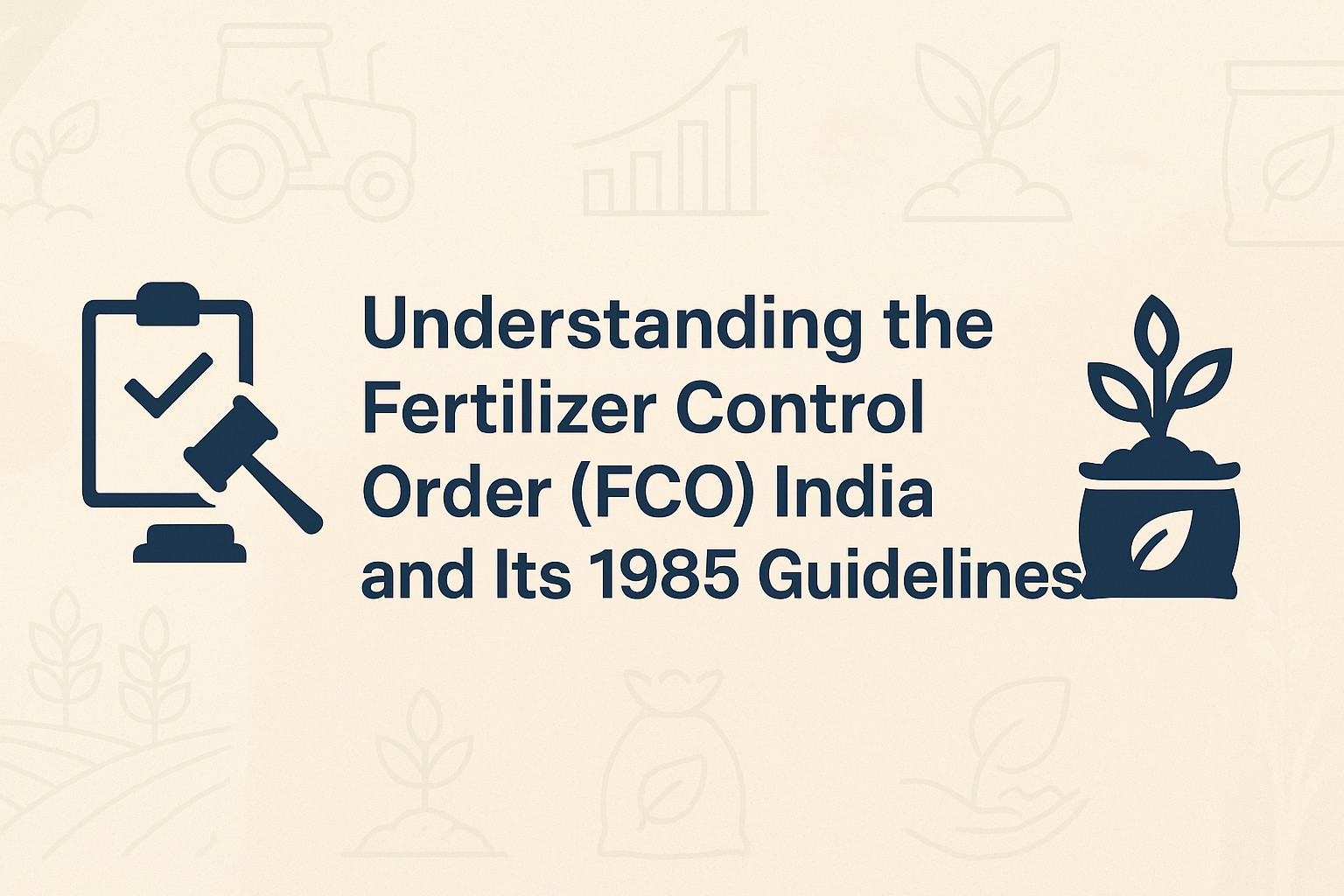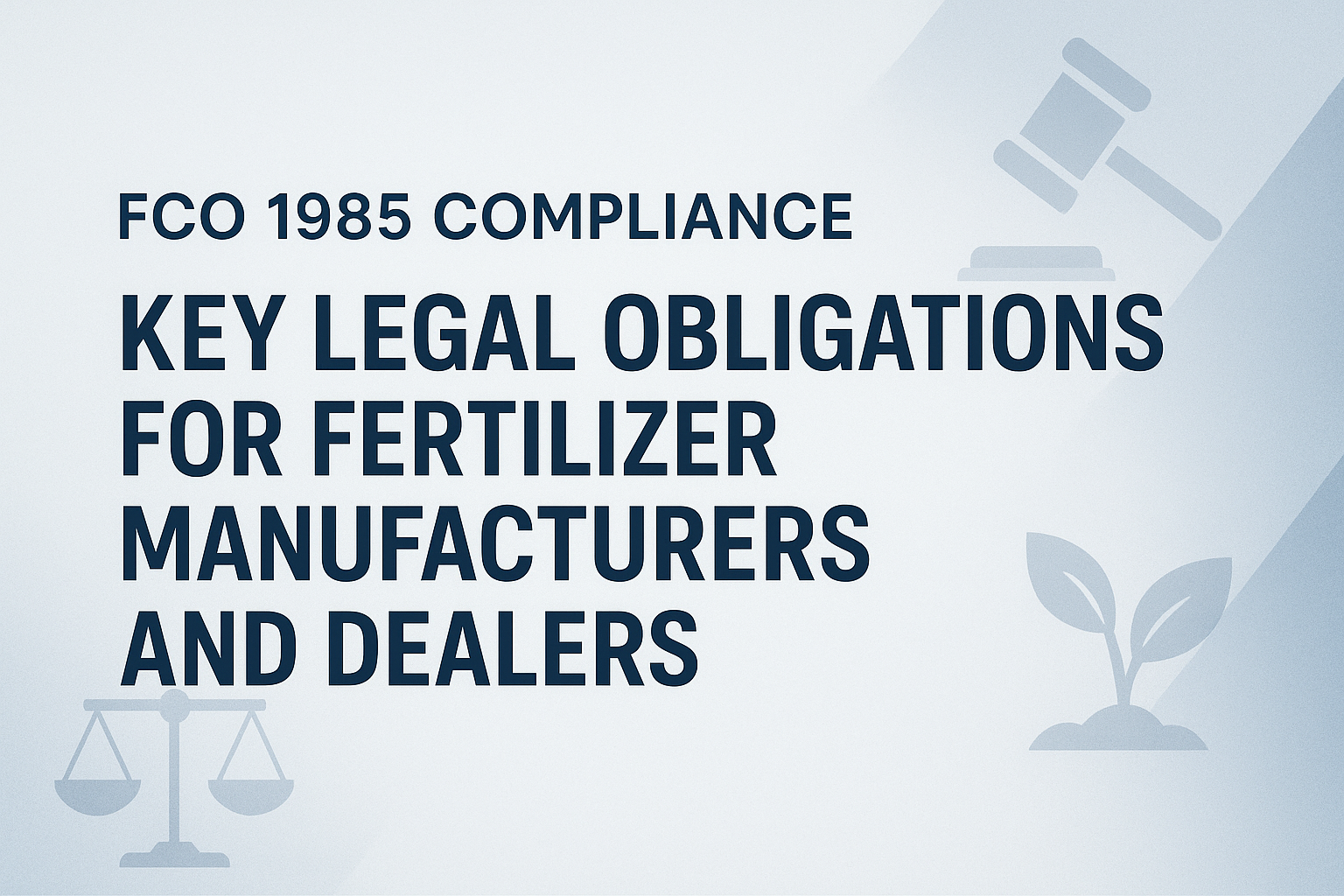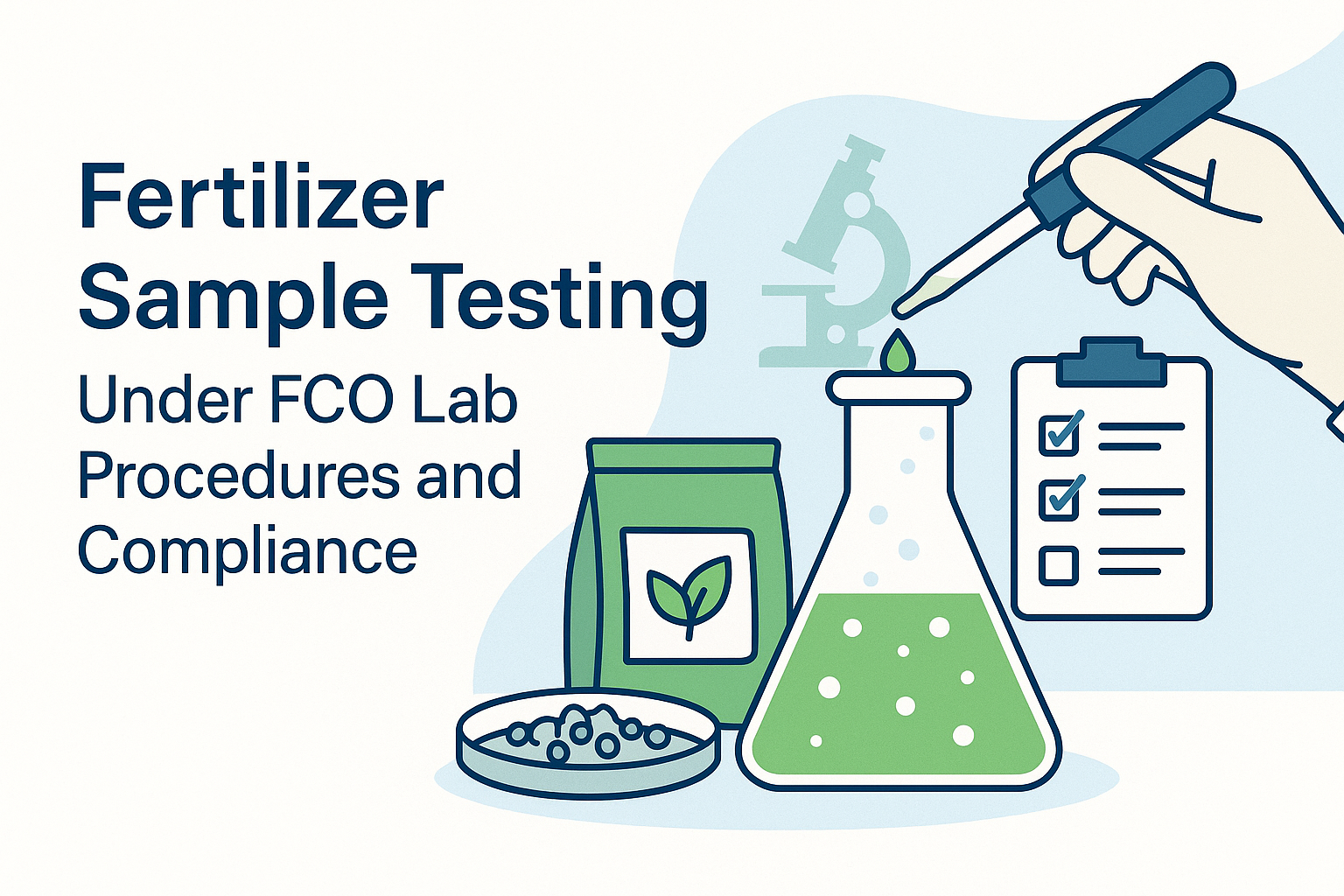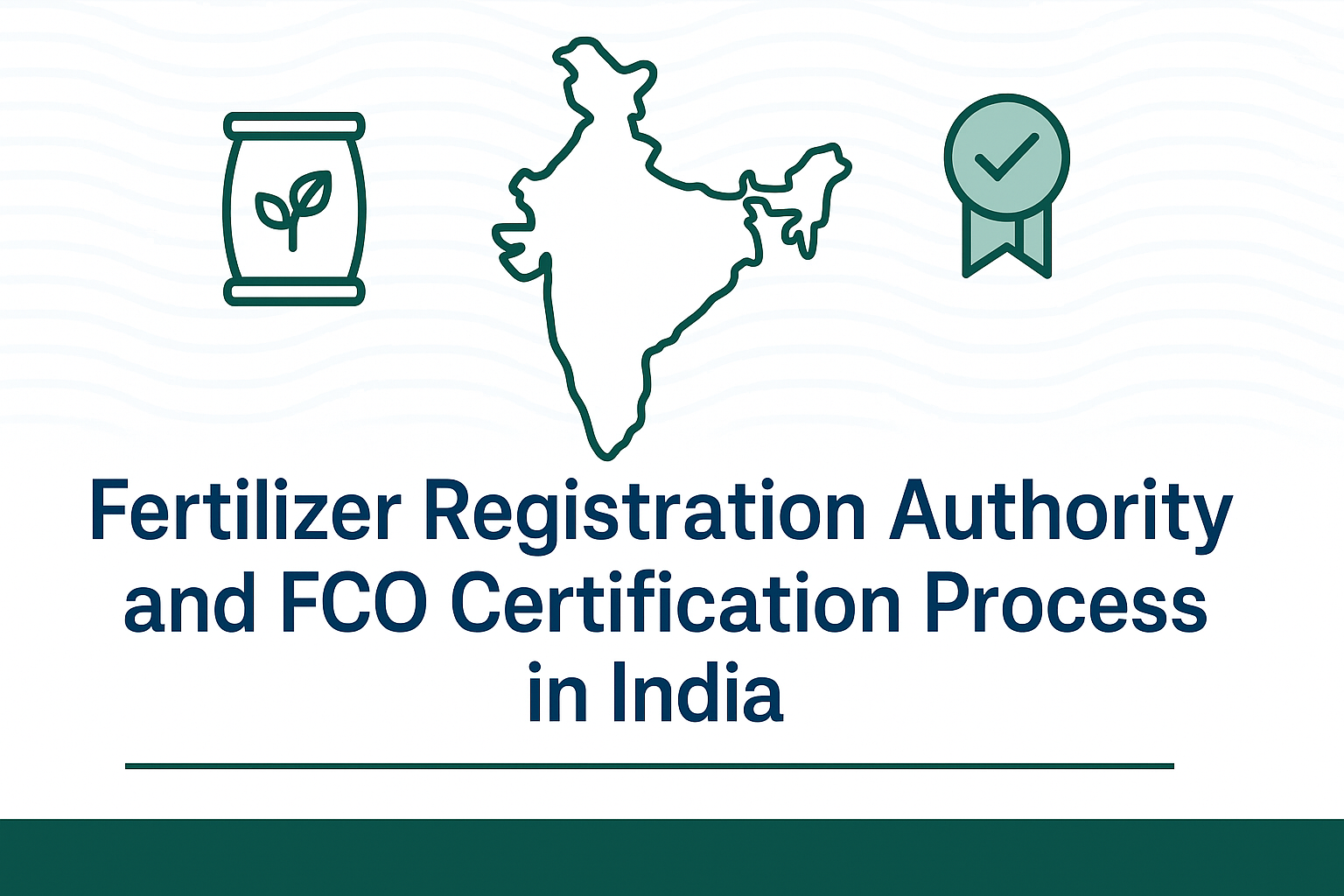Fertilizer Control Order (FCO) India—Guidelines, Licensing & Compliance 2025
Understanding the Fertilizer Control Order (FCO) India and Its 1985 Guidelines
Introduction
Fertilizer control Order, India (which was originally issued in 1985), is the core of regulation of fertilizer industry in India. The FCO, which is issued under the Essential Commodities Act, 1955, seeks to ensure that the fertilizers that are traded in the Indian markets conform to specified nutrient standards, labeling standards, and packaging standards in addition to ensuring that products sold by different manufacturers, imports, and dealers are of the same standard in terms of quality.
Necessary requirements include the licensing, registration, packaging, lab-testing, and marketing of fertilizers. These include bio-stimulants, customized fertilizers, organic inputs, and traditional chemical fertilizers which is stipulated in the FCO 1985 guidelines. These instructions have been constantly revised to fit the changing agricultural activities and technology changes. Since 2025, new amendments are also aimed at tracking in the digital world, marking with a barcode, and relentless disclosures of nutrient content.
With the help of FCO, the Government of India controls the production, sale, importation and quality control of fertilizers using a set of identical fertilizer control regulations applied to all states of India. Be it a fertilizer manufacturer or dealer, the FCO should be observed to operate within the limits of the law.

FCO 1985 Compliance: Key Legal Obligations for Fertilizer Manufacturers and Dealers
Totally complying with the FCO 1985 is not an option to the fertilizer companies to allow them to be able to work legally in India. The legislation uses different types of fertilizers, inorganic, organic, bio-stimulants, and customized fertilizers, which have their technical standards and requirements as per the procedures.
Licensing Obligations
Any party that aims at manufacturing, importing, or distributing or selling fertilizers should acquire corresponding FCO licenses. Most common licenses are:
- Manufacturer’s License
- Importer’s License
- Dealer / Retailer License
The State Agriculture Department issues such licenses, occasionally renewing them after verifying them and post documentation. The facilities or the sales points must have their own license.
Requisite Declarations and Labeling
There are also mandatory declarations required by manufacturers and importers of fertilizers to be printed on each package of fertilizers. These include:
- Label and grade of a fertilizer
- Assured composition of nutrients
- The number of the batch and date of production
- Expiry date
- FCO license no.
- Maker/bringer facts
- Using and storing instructions
The labeling requirements by FCO make end-users know exactly what is in their products and it allows the regulatory bodies to track down the batches in case of quality issues.
Things called Documentation and Storage
FCO requires that production and sales should be documented appropriately and should be presented when inspectors call. Moreover, fertilizers should be stored in depots that are equipped with safety and hygiene standards and that do not contaminate and degrade the quality of products.
Non-compliance Penalties
Breach of FCO standards, including mislabeling, underweight bags, or low-quality nutrient components, may end up leading to:
- License cancellation
- Heavy fines
- Product bans
- Criminal action in accordance to the Essential Commodities Act
It is therefore important that FCO 1985 compliance is done through maintenance of accurate records, open labeling and assurances of its product quality.

Fertilizer Sample Testing Under FCO: Lab Procedures and Compliance
In the process of quality control under FCO, sampling and testing of fertilizers is important. This is accomplished using state and central fertilizer testing labs which are accredited in terms of the FCO arrangement.
Procedure Overview:
Sample Collection
The Fertilizer Inspectors take random samples of manufacturing units, storage godowns or buying outlets.
Testing Parameters
The following is tested in samples:
- Nutrient concentration (NPK concentrations)
- Moisture content
- Pollutant or adulterants
- Labeling, label compliance and packaging integrity
Test Reports and Action
When the fertilizer goes through, the manufacturer is awarded with a certificate of conformity. In case of failure, proceeding of law is taken under FCO and Essential Commodities Act.
Manufacturers are compelled to have in-house laboratories and quality inspection before dispatching products lest manufacturers be non-compliant.

Fertilizer Registration Authority and FCO Certification Process in India

The FCO registration process is under the Ministry of Chemicals and Fertilizers, which monitors the process through Fertilizer Registration Authority India. When launching either a new fertilizer product or that of an improved grade, this is the format that needs to be taken by the companies:
Procedure of FCO Registration:
Application Submission
Fill the application on Form A together with the product dossier of chemical composition, production method and safety information.
Field Trial Results
Testing should be done in institutes that have been accredited by ICAR to determine the effectiveness and safety of the fertilizer of any crop and in any type of soil.
Label and Package Design
These draft labelling and packaging should comply with FCO label and packaging standards which nations include multi-language instructions and disclosures.
Analytical Report
Full lab tests conducted by a third party on nutrient content with no presence of toxic contaminants are mandatory.
Approval and Assessment
Finally, the documents, the lab reports, and the results of the trials are reviewed by the FCO Committee before the final registration and the product code is given.
Authority and Extension
The validity period of the FCO certificates is around three years, and the certificate is valid after this period, and it requires a person to apply 90 days before the expiry of the certificate.
Fertilizer Registration Under FCO: 2025 Norms and Labeling Rules
It is now mandatory that organic fertilizers, which include city compost, vermicompost, and phosphate-enriched organic manure (PROM) be registered under the FCO before being able to market or sell in India. Registration entails providing the detailed profile of the product including nutrient composition, carbon to nitrogen ratio, microbial load, and the limit of pathogens. The applicants are also required to submit test results of organic fertilizer approved laboratories to ensure that the nutrient content of the organic fertilizer is within the highest limit as well as absence of any form of toxic substances, such as heavy metals or dangerous bacteria.
According to the FCO standards, the information that should be marked on organic fertilizers includes the name of the product, percentages of the specific nutrient (including the total organic carbon and nitrogen), the source of organic matter, and the process in which they were produced as well as how to use the product. Packaging should also be done in an environmentally friendly way, that is, packaging that is biodegradable or recyclable should be done. Such regulatory measures would be necessary not only to provide quality assurance and safety for farmers but would also encourage sustainable agriculture by the use of certified organic inputs.
Customized Fertilizer Approval in India: Liquid, WSF & Specialty Products
Fertilizers that are customized entail that their scientific formulation is a blend of fertilizers that is specific to the needs of crops in terms of soil, climate, and agro-ecology of the region. As more solutions per crop are being demanded through the Fertilizer Control Order (FCO), customized fertilizers, such as liquid fertilizers, water-soluble fertilizers (WSF), and other specialty nutrient products, can be registered and approved.
In order to get approval, manufacturers are to send a proposal to the Department of Fertilizers, which would provide the details of composition of the fertilizer, the crop to be used, and the procedure of application. Whether conducted by ICAR or state agricultural universities, multi-location trials of crops must be conducted to exhibit efficacy. Moreover, the nutrient level and formulation safety should be confirmed by analytical data available in certified laboratories.
According to the guidelines of FCO, every tailor-made fertilizer should be labeled correctly with application rates, nutriment proportions, crop advisory, and danger warnings. The packaging should be according to FCOs to avoid contamination and abuse.
Such a regulatory system makes sure that farmers get suitable and customized fertilizer that has been scientifically tested as well as being free of environmental hazards. The FCO enables the productivity and minimization of nutrient loss as well as maintaining better soil by enabling such precision in agriculture inputs particularly in areas that use advanced practices such as fertigation and soil drip irrigation.
FCO Fertilizer Licensing: Manufacturer, Importer, and Dealer Permissions
The Fertilizer Control Order (FCO) sets a condition where any person or business unit that deals directly with the manufacturing, importation, or marketing of fertilizers in India must ensure that they acquire the right license. The licensing program is geared toward the realization of product quality, traceability, and accountability within the entire supply chain of the fertilizer.
The manufacturers, on the other hand, get an FCO registration after producing necessary papers at the State Agriculture Department, which requires a manufacturing unit layout, pollution clearance, a fire safety certificate, and technical personnel with qualification proofs. The unit also needs to have an in-house laboratory where quality can be tested. Licenses needed by different manufacturing locations are separate.
To obtain the license as an importer, the central authority requires the applicant to give information about the foreign supplier, product specifications of the items to import, a Memorandum of Understanding (MoU) between them and the domestic distributors, as well as a test report of each batch of imported items. Imported fertilizers have to be tested and certified by the approved laboratories of FCO and can come into the market.
Frequently Asked Questions
The FCO is a regulatory framework that governs the quality, licensing, and sale of fertilizers in India.
The Central Government and State Fertilizer Inspectors enforce the FCO 1985 provisions.
Submit an application with technical specs, samples, and trial data to the designated FCO authority.
You need product details, a manufacturing license, analytical reports, and labeling formats.
Apply through the state agriculture department with supporting documents and fee payment.
Labels must include nutrient composition, batch number, expiry date, and license number.
Yes, bio-stimulants must be registered under FCO as per the latest 2025 guidelines.
Samples are tested regularly by state authorities to ensure nutrient and label compliance.
Typically, an FCO license is valid for three years and must be renewed before expiry.
- FCO compliance is mandatory for importers/exporters to ensure quality and safety of fertilizers.
Why Choose United Enterprises?
With over 7 years in regulatory consulting, we have in-depth knowledge of fertilizer laws, government procedures, and technical standards.
From initial application to final approval, we handle every aspect of the fertilizer registration process.
We tailor our fertilizer consulting services to suit your business model—whether you’re a small-scale organic fertilizer producer or a large importer of chemical fertilizers.
Our connections with government officials, lab testing agencies, and industry stakeholders ensure faster processing and minimal delays.
Our track record of successfully registering multiple agrochemical products makes us a preferred consulting partner in the industry.
Key Services
1. Fertilizer Registration Assistance
We offer complete support for obtaining fertilizer registration under the FCO. Whether you’re a new manufacturer or importer, we handle documentation, application filing, coordination with government authorities, and follow-ups until approval is granted.
2. FCO License Consulting
Our team provides personalized fertilizer consulting to help you acquire the appropriate FCO license—whether for wholesale, retail, or manufacturing. We ensure that your business meets all technical, infrastructural, and legal requirements under the Fertilizer Control Order 1985.
3. Documentation & Compliance
Stay FCO-compliant with our expert assistance in maintaining records, batch reporting, sample analysis, and packaging label approvals. We help you navigate inspections and audits with ease.
4. Amendments & Renewals
We take care of periodic renewals and any amendments required in your fertilizer license or registration, ensuring continuity and legal standing of your operations.


